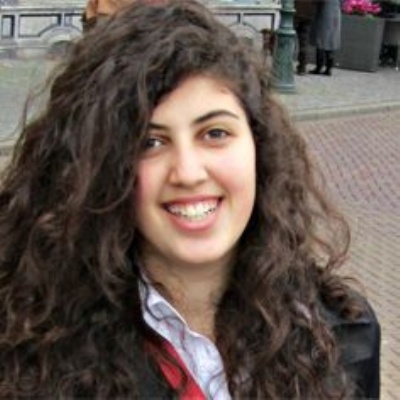Sarah Salloum

Sarah was selected to attend UWC Maastricht in 2013.
1. How would you describe your UWC experience so far?
My UWC experience has been quite enriching. I got to know so many new things in the world that vary from famous TV shows to political and financial situations. This is the place where I get to be myself, the place where society will not be able to stop me from doing what I wish to do. I have joined really interesting clubs like "Gender Commission," which is a club in which we talk about gender issues and news around the world, including the effect of culture and religion on that.
Another club is a political discussion group where people meet and talk about political issues around the world. This is the kind of thing that I didn't get to do back home, and this is the kind of thing that makes a UWC experience special, particularly for someone coming from the Middle East. And even though this has been going quite well, it's still difficult with all of my family and friends still in Syria, and I feel guilty most of the time; being here and having everything, and everyone that I love being back home with almost nothing. It's also difficult having to worry about people's safety all the time. But I suppose that's why I'm here, because I want to change that. I want to contribute in bringing peace back to my country and giving my people everything that they deserve to have. I want to make their lives better and that's definitely the thing that motivates me the most to go through this experience step by step no matter how hard it may seem sometimes. There's always a light at the end of the tunnel, and it's pulling me towards it.
2. How is the International Baccalaureate different from the Syrian educational system?
My first issue with the IB was studying in English. Having to know all the terms in biology and chemistry and maths and EVERYTHING was the most difficult part because unfortunately we don't learn the English terms for things in Syria.
Another thing is that the IB has lots of practical dimensions, and sometimes you might feel like you're not keeping up with everyone because most of them have already done what you're doing, while in Syria we never do any practical (public schools at least), but you should just ask the teacher and just make it clear that this isn't something you're familiar with and you should be fine. One of the other differences is the equal care about all subjects, so basically arts and sports… etc. are ALL just as important as any other subject is, which is something we don't see in Syria since we still call the arts period a "free period".
Moreover, I should point out that we get to choose our subjects very specifically in the IB, which is also a very difficult part and I still don't know if I've chosen the right ones. I don't know the solution to this yet but it's one of the big differences because we don't get much of a choice in Syria.
Finally, the most important difference would probably be that instead of giving information to memorize, teachers barely give you the first piece of information and it's your job to do research and find out about it. I still find this part extremely difficult and time-consuming, and as much as I would rather do it the easy way, I'm quite sure this is the right way to do things because the piece of information you find out yourself is a lot more understandable for you that the piece of information given to you. And also, quoting J.K. Rowling: "There will be a time when we must choose between what is easy, and what is right."
